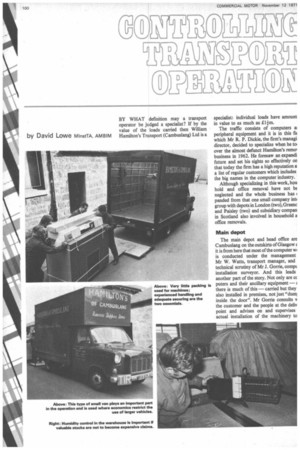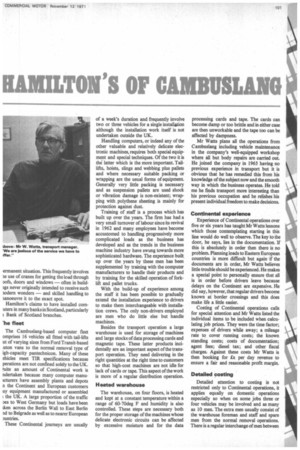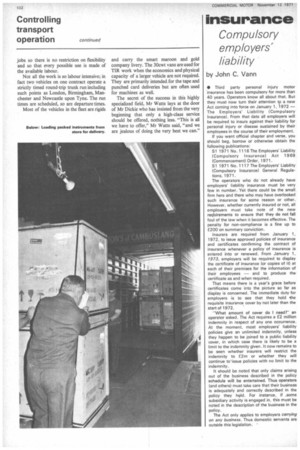g g R E im - iFERE
Page 102

Page 103

Page 104

If you've noticed an error in this article please click here to report it so we can fix it.
HAMILTON'S OF WOMAN
BY WHAT definition may a transport operator be judged a specialist? If by the value of the loads carried then William Hamilton's TrEnsport (Cambuslang) Ltd is a specialist: individual loads have amount in value to as much as Eltm.
The traffic consists of computers a: peripheral equipment and it is in this fit which Mr R. P. Dickie, the firm's managi director, decided to specialize when he to over the almost defunct Hamilton's remo, business in 1962. He foresaw an expandi future and set his sights so effectively on that today the firm has a high reputation a a list of regular customers which includes the big names in the computer industry.
Although specializing in this work, hou hold and office removal have not be neglected and the whole business has panded from that one small company int4 group with depots in London (two), Greene and Paisley (two) and subsidiary compan in Scotland also involved in household a office removals.
Main depot
The main depot and head office are Cambuslang on the outskirts of Glasgow E it is from here that most of the computer wi is conducted under the management Mr W. Watts, transport manager, and technical scrutiny of Mr J. Gorrie, compt installation surveyor. And this leads another part of the story. Not only are cc puters and their ancillary equipment— there is much of this — carried but they also installed in premises, not just "dumi inside the door". Mr Gorrie consults v the customer and the people at the defile point and advises on and supervises actual installation of the machinery to
ermanent situation. This frequently involves le use of cranes for getting the load through Das, doors and windows — often in buildigs never originally intended to receive such rodern wonders — and skilled handling to ianoeuvre it to the exact spot.
Hamilton's claims to have installed cornuters in many banks in Scotland, particularly Bank of Scotland branches.
he fleet
The Cambuslang-based computer fleet omprises 16 vehicles all fitted with tail-lifts ut of varying sizes from Ford Transit-based uton vans to the normal removal type of igh-capacity pantechnicon. Many of these chides meet TIR specifications because perations are not confined solely to the UK. luite an amount of Continental work is ndertaken because many computer manuicturers have assembly plants and depots n the Continent and European customers uy equipment manufactured or assembled L the UK. A large proportion of the traffic 3es to West Germany but loads have been iken across the Berlin Wall to East Berlin 1c1 to Belgrade as well as to nearer European 3untries.
These Continental journeys are usually
of a week's duration and frequently involve two or three vehicles for a single installation although the installation work itself is not undertaken outside the UK.
Handling computers, or indeed any of the other valuable and relatively delicate electronic machines, requires both special equipment and special techniques. Of the two it is the latter which is the more important. Taillifts, hoists, slings and webbing plus pallets and where necessary suitable packing or wrapping are the usual forms of equipment. Generally very little packing is necessary and as suspension pallets are used shock or vibration damage is non-existent; wrapping with polythene sheeting is mainly for protection against dust.
Training of staff is a process which has built up over the years. The firm has had a very small turnover of labour since its revival in 1962 and many employees have become accustomed to handling progressively more complicated loads as the business has developed and as the trends in the business machine industry have swung towards more sophisticated hardware. The experience built up over the years by these men has been supplemented by training with the computer manufacturers to handle their products and by training for the skilled operation of forklift and pallet trucks.
With the build-up of experience among the staff it has been possible to gradually extend the installation experience to drivers to make them interchangeable with installation crews. The only non-drivers employed are men who do little else but handle machines.
Besides the transport operation a large warehouse is used for storage of machines and large stocks of data processing cards and magnetic tape. These latter products incidentally are an important aspect of the transport operation. They need delivering in the right quantities at the right time to customers so that high-cost machines are not idle for lack of cards or tape. This aspect of the work is more of a regular distribution operation.
Heated warehouse
The warehouse, on four floors, is heated and kept at a constant temperature within a range of 60-70deg F and humidity is also controlled. These steps are necessary both for the proper storage of the machines whose delicate electronic circuits can be affected by excessive moisture and for the data processing cards and tape. The cards can become damp or too brittle and in either case are then unworkable and the tape too can be affected by dampness.
Mr Watts plans all the operations from Cambuslang including vehicle maintenance in the company's well-equipped workshop where all but body repairs are carried out. He joined the company in 1965 having no previous experience in transport but it is obvious that he has remedied this from his knowledge of the subject now and the smooth way in which the business operates. He told me he finds transport more interesting than his previous occupation and he relishes his present individual freedom to make decisions.
Continental experience
Experience of Continental operations over five or six years has taught Mr Watts lessons which those contemplating starting in this line would do well to observe. The key to the door, he says, lies in the documentation. If this is absolutely in order then there is no problem. Planning loads to Eastern European countries is more difficult but again if the documents are in order, Mr Watts believes little trouble should be experienced. He makes a special point to personally ensure that all is in order before drivers leave because delays on the Continent are expensive. He did say, however, that regular drivers become known at border crossings and this does make life a little easier.
Costing of Continental operations calls for special attention and Mr Watts listed the individual items to be included when calculating job prices. They were the time factor; expenses of drivers while away; a mileage rate to cover running costs; the known standing costs; costs of documentation; agent fees; diesel tax; and other fiscal charges. Against these costs Mr Watts is then booking for Lx per day revenue to ensure a fair and reasonable profit margin.
Detailed costing
Detailed attention to costing is not restricted only to Continental operations, it applies equally on domestic operations especially so when on some jobs three or four vehicles may be involved and as many as 10 men. The extra men usually consist of the warehouse foreman and staff and spare men from the normal removal operations. There is a regular interchange of men between jobs so there is no restriction on flexibility and so that every possible use is made of the available labour.
Not all the work is so labour intensive; in fact two vehicles on one contract operate a strictly timed round-trip trunk run including such points as London, Birmingham, Manchester and Newcastle upon Tyne. The run times are scheduled, so are departure times.
Most of the vehicles in the fleet are rigids
Below: Loading packed instruments from store for delivery.
and carry the smart maroon and gold company livery. The 30ewt vans are used for TIR work when the economics and physical capacity of a larger vehicle are not required. They are primarily intended for the tape and punched card deliveries but are often used for machines as well.
The secret of the success in this highly specialized field, Mr Watts lays at the door of Mr Dickie who has insisted from the very beginning that only a high-class service should be offered, nothing less. "This is all we have to offer," Mr Watts said, "and we are jealous of doing the very best we can."










































































































































































































